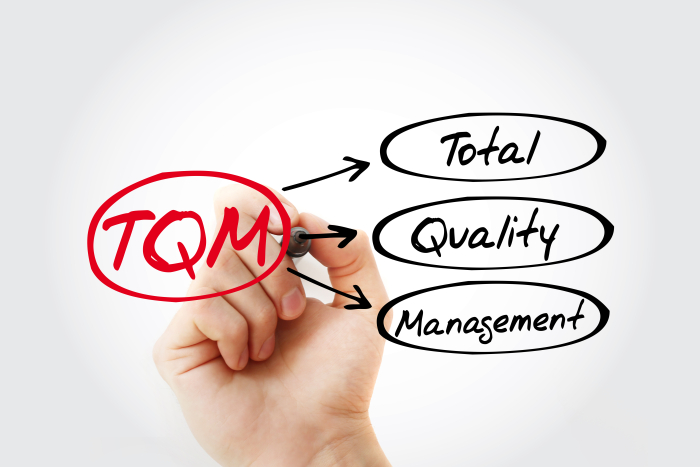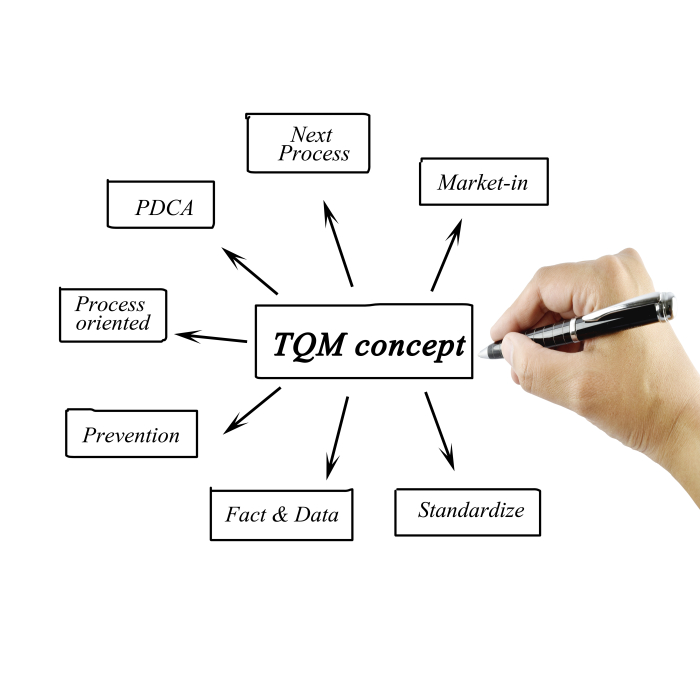
 Data Structure
Data Structure Networking
Networking RDBMS
RDBMS Operating System
Operating System Java
Java MS Excel
MS Excel iOS
iOS HTML
HTML CSS
CSS Android
Android Python
Python C Programming
C Programming C++
C++ C#
C# MongoDB
MongoDB MySQL
MySQL Javascript
Javascript PHP
PHP
- Selected Reading
- UPSC IAS Exams Notes
- Developer's Best Practices
- Questions and Answers
- Effective Resume Writing
- HR Interview Questions
- Computer Glossary
- Who is Who
Role of Managers in Total Quality Management
When managers implement Total Quality Management (TQM) in their organizations, it can have a plethora of positive benefits. Not only will it improve the quality of the products and services provided by the organization, but it also helps boost morale among employees as well. Leadership in quality management is the supporting pillar of growth in an organization. Without a guiding force, the quality management process is not effective enough to place the firm in a winning position. Managers have a major role to play in total quality management to ensure efficiency in achieving organizational goals. In this article, we shall look into the role that managers play in establishing total quality management.

What Is Total Quality Management?
TQM, or total quality management, is a long-term process of implementing control over the quality of products and services offered by the organization. It is an organizational framework to deliver customer satisfaction by improving quality over a long period. TQM involves all employees involved in the production process, from the lowest ranking to the highest level, to ensure quality control and excellent customer service. It is an ongoing process of monitoring the production process, identifying areas for improvement, and implementing control processes to maintain quality. It focuses on keeping the employees trained and up to speed while delivering a high-quality customer experience.
In order to ensure that TQM is successful, managers must be able to effectively communicate with all levels of staff within their organization. It's important for them to provide clear instructions and goals so that everyone knows what is expected of them. Additionally, managers should create an environment of trust and support so that employees feel comfortable taking risks and pushing themselves outside of their comfort zones.

The Role of Managers in Total Quality Management
Managers play an essential role in total quality management (TQM). They are responsible for setting the standards of excellence and quality in the organization, as well as developing plans and processes to ensure that these standards are met. Managers also need to be proactive in looking for and addressing areas where performance can be improved. This requires a great deal of commitment from the manager, as they must be willing to put in the extra effort to make sure that everything is running smoothly. Here is how managers support the process of implementing quality management in a firm ?
Involving All Departments in The Implementation Of TQM
Effective TQM can be achieved when there is an organizational environment involving all group leaders and departments. Managers are responsible for creating accountability for each team and delivering data pointers to the TQM implementation team. A manager must involve everyone in the organization in implementing quality management processes in their respective jobs. The TQM implementation team can involve individuals from different units of the organization to ensure their departments are on track with the quality control processes. Having a responsible work environment helps the organization gain a competitive advantage as the employees are directly involved in the company's growth.
Leading by Example
A manager must get his subordinates to follow their quality management strategy by leading by example. A manager must be proactive in implementing quality management procedures and demonstrate the results to the 4team well. This helps the implementation team understand the importance and benefits of TQM. Overall, it is essential for managers to actively participate in TQM initiatives if they want to achieve maximum results. By taking an active role in setting standards and providing feedback, they will create a culture of excellence within their organization, which will ultimately lead to increased customer satisfaction and profits.
Creating Flexible Implementation Strategies
Managers play a vital role in ensuring that employees are aware of the importance of quality and its impact on the organization's bottom line. They also need to provide employees with the resources and training necessary to perform their jobs effectively. In addition, managers need to be able to identify and correct problems quickly. By doing so, they can prevent small problems from becoming bigger ones. Finally, managers need to provide feedback on a regular basis so that improvements can be made quickly and effectively. Feedback should not only focus on areas where performance needs improvement but also highlight any successes or achievements that have been made. By doing this, managers can help motivate their team to continue striving toward excellence.
Training and Development of The TQM Implementation Team
Managers are responsible for setting the tone for the organization, setting clear goals and expectations, and providing leadership and guidance for their teams. In addition, managers are often tasked with measuring performance and making improvements where needed. It is beneficial for the organization to have their managers train the team about TQM implementations rather than outsource trainers. Managers have deep knowledge about the company and can help the employees develop the same sense of commitment through their training. It also helps managers optimize their training procedures as they are aware of the strengths and weaknesses of their subordinates.
Benefits of Total Quality Management
With TQM, employees are motivated to work harder in order to meet the high expectations set by management. This encourages them to take ownership of their tasks and strive for excellence in everything they do. It also allows for open communication between workers and managers, which creates an environment of collaboration that ultimately leads to better results.
In addition, TQM encourages innovation and creativity within the workplace. Managers must take the lead on this front and provide employees with the resources they need to develop their own ideas and solutions. This can result in improved efficiency, cost savings, and better customer service.
Finally, TQM increases customer satisfaction. When customers receive high-quality products or services that meet their needs, they are more likely to come back for repeat business or recommend your company to others. In addition, it builds trust within the community and can help you gain new customers through word-of-mouth referrals.
Challenges of Implementing Total Quality Management
Organizations with high-quality management standards always have an edge over the market. However, there are some challenges that make it difficult for managers to implement quality management strategies, namely ?
Having a change-resistant team makes it difficult to implement quality control as they are reluctant to change their current working patterns.
The quality of deliverables is reduced considerably under autocratic leadership. Employees working under a dictatorial manager often operate out of fear and, as a result, cannot deliver 100% productivity, which affects quality.
A lack of commitment from the employees can hamper the implementation of quantity management techniques, as they are not dedicated to the success of said procedures.
Misinterpretations and the loss of valuable information can result from an organization's poor communication flow. As a result, quality control techniques can go in the wrong direction and deliver poor results.
Conclusion
By implementing Total Quality Management in your organization, you can reap all the benefits mentioned above while improving the overall quality of your products and services. It's a win-win situation for everyone involved!

